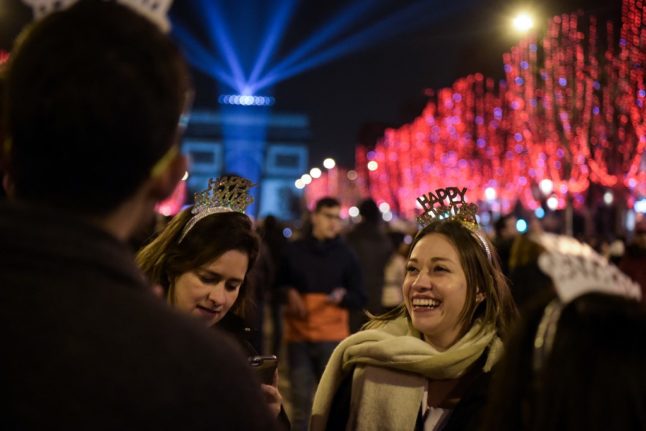While December 31st is a night that many look forward to – from fun parties to ring in the new year or fireworks displays – the same rules and regulations that apply on any other day continue to apply on New Year’s eve – or Saint-Sylvestre in French. Here are the specific rules you should be aware of before commencing your New Year’s festivities in France this year:
Can I host a party?
In previous years, the French government issued recommendations regarding a maximum number of people per gathering to limit the spread of Covid-19. This year, there are no regulations regarding group sizes or parties so yes you can host a party.
READ MORE: Paxlovid and vaccines: The latest Covid advice from the French government
How late can I make noise?
If you are planning to host a party at your French home, you should be aware that there is not an exception to the rule regarding night-time disturbances on New Year’s Eve. Between 10pm and 7am, noise pollution – whether that be general noise, music, or loud talking, can be classified as a night-time disturbance according to the French Penal Code which is punishable by a fine of €68.
If you are hosting a party, you should be aware that the noise must be audible from one dwelling to another to constitute a night-time disturbance, so as long as you keep the sounds of your party within your dwelling, you should not have any issues.
It is always recommendable to warn your neighbours ahead of time if you are planning a particularly loud event.
Can I set off fireworks from my private property on New Year’s Eve?
Technically, French law does not prohibit you from setting off fireworks in your own backyard, but rules can vary by municipality, and factors such as the weather and how crowded the environment is can restrict the setting off of fireworks. Thus, it is best to operate with caution.
Before planning a fireworks display in your garden, it would be advised to call your local Mairie to see if there are any local rules that might apply. A municipal regulation might prohibit or limit the use of fireworks if they are seen to present a danger for the environment (according to the Environment Code) or if they pose a safety risk – you might not be able to set off fireworks during a drought or if there are strong winds, for instance. Local authorities can also establish their own rules regarding the transportation of flammable objects, such as fireworks.
You are not allowed to set off fireworks in a crowded or urban area or in a confined space. Failure to comply with this regulation can result in a hefty fine of between €1,500 to €150,000 as well as 10 years in prison if damage is caused by the fireworks.
In France, fireworks are classified as pyrotechnic articles that contain explosive substances and separated into four categories based on risk-level, with the first category (F1/C1) being the lowest level of risk to the fourth category (F4/C4) which includes highly dangerous fireworks only to be operated by qualified professionals. The third category represents the most dangerous fireworks that can be set off by amateurs, and they can only be fired in open air and only in large open spaces.
Can I drink alcohol in public spaces on New Year’s Eve?
In an effort to maintain the public order, several localities across France have rules regarding the consumption of alcoholic beverages in the public space (streets, parks, etc) on New Year’s Eve. Some local authorities, like those in the Morbihan in Brittany, in Pyrenees-Oriantales in the South, and Vosges in the east, have banned all consumption of alcohol in public spaces starting in the evening on the 31st and running through the morning of Sunday the 1st.
Additionally, the French penal code prohibits overt drunkenness in public spaces. While there is no defined blood alcohol level to define “overt drunkeness,” law enforcement officials are tasked with assessing the level of intoxication based on the individual situation. Law enforcement officials are also authorised to place an intoxicated person in a ‘sobering-up cell’ where the person will be kept until they sober up.
You can be arrested for being overtly drunk in the public space, and you can also risk a fine of up to €150.
Can I have leave my lights display on all night?
Many households across France enjoy setting up lights displays outside their homes during the Christmas and New Year’s holidays. However, you should be aware that excessive lights can also be classified as a night-time disturbance, particularly if the display makes noise after 10pm.
While several localities across France have instituted rules regarding light displays on public buildings, in an effort to decrease energy consumption during the winter of 2022-2023, individual households are not beholden to the same regulations. Nevertheless – the French government has issued recommendations that people limit their energy usage, notably by turning off lights at night, to help avoid energy shortages this winter.
READ MORE: The French government’s tips to cut household energy use by 10%



 Please whitelist us to continue reading.
Please whitelist us to continue reading.
Member comments